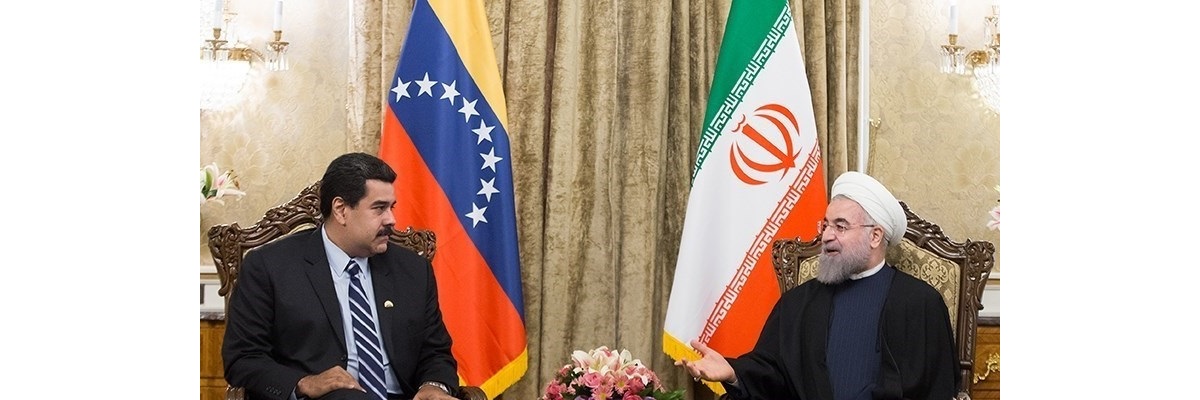Diplomacy
Iran's shadow in South America: the foreign policy of the ayatollahs' regime in the region

Image Source : Wikimedia Commons
Subscribe to our weekly newsletters for free
If you want to subscribe to World & New World Newsletter, please enter
your e-mail
Diplomacy

Image Source : Wikimedia Commons
First Published in: Apr.21,2024
May.27, 2024
The events in the Middle East have the international community on alert. Iran understood the April 1st attack on the Iranian consulate in Damascus as a blow to its own territory and a violation of its sovereignty. After several days of threats, on April 13th and for five hours, Iran used 300 projectiles (170 drones, more than 30 cruise missiles and 120 ballistic missiles) to attack Israeli territory, 99% of which were intercepted. These movements in the geopolitical scenario can be felt in geographically distant regions such as Latin America. To interpret this new scenario, it is necessary to understand how Iran is currently positioned in this region. Its approach to the region is focused on creating ties with states that may be ideologically sympathetic. This is demonstrated by the relationship with Cuba since the end of the first Gulf War, the close relationship with Venezuela, the closeness with Daniel Ortega’s dictatorship in Nicaragua and with Bolivia since the mandate of Evo Morales. Iran has seen the leftward shifts in Latin America as an opportunity to acquire new trading partners, increase its influence in the region and carve out an increasingly important space in the US backyard. Current Iranian Minister of Defense, Mohammad Reza Ashtiani, stressed that “South American countries have a special place in Iran’s foreign and defense policy because they are located in a very sensitive area”. In this sense, we can highlight two key countries: Bolivia and Venezuela.
Bolivia represents the greatest Iranian foreign policy success in Latin America. Diplomatic relations between these two states date back to 2007. With less than twenty years of friendship, the two signed in July 2023 a memorandum of bilateral cooperation in terms of security and defense that may pose a threat to the stability in the region. The agreement is aimed at assisting Bolivia in its fight against drug trafficking and supporting the state in monitoring its borders. The agreement includes the sale of material and training of military personnel. However, the details of the agreement were not disclosed because they are protected by a confidentiality clause. The Bolivian Minister of Defense, Edmundo Novillo, described Iran as a scientific, technological, security and defense example “for nations that want to be free”, despite the current international sanctions. The agreement entails benefits for both parties. Bolivia will receive weapons, will improve its cyber-operations capabilities and training of military forces’ personnel. On the other hand, Iran will have access to Bolivia’s natural resources, including lithium and gas. It would also be strategically positioned in the heart of South America, where its proxy, Hezbollah, has activities in the Triple Frontier (Argentina, Brazil, and Paraguay) and a relationship with the various cartels operating in the region, according to a report by the Wilson Center. This same report notes that the area of the Triple Frontier has for decades been the center of Iranian and Hezbollah activity in Latin America, taking advantage of the large Lebanese and Shiite diaspora communities. According to the late Argentinian special prosecutor Alberto Nisman, Hezbollah established its presence in Latin America in the mid-1980s, starting in the Triple Frontier area, a relatively lawless region.
Two days before the Iranian attack on Israel, the Federal Chamber of Criminal Cassation of Argentina, the highest criminal court in the country, condemned Iran for the 1992 attacks in Argentina against the Israeli embassy in Buenos Aires and in 1994 against the Israelite Mutual Association of Argentina (AMIA, in Spanish). This ruling proves that the attacks, carried out by the terrorist group Hezbollah, were committed at the behest of the government of that theocracy. After the trial in absentia, it was ratified that those attacks constitute a crime against humanity. This implies that the crimes committed are considered imprescriptible, and the verdict describes Iran as a terrorist state. A series of events has resulted in three decades of impunity. The scandals that led to the imprisonment of the judge and prosecutors in the case, the issuance of Interpol (International Criminal Police Organization) red notices against five former Iranian officials and the investigation against two former presidents, Carlos Menem (1989-99) and Cristina Fernández de Kirchner (2007-15), torpedoed the process. These events, along with the death under strange circumstances of the special prosecutor for the AMIA case, Alberto Nisman, hours before presenting key evidence to the Congress in 2015, explained the delay in the sentencing against Iran.
In November 2023, the Brazilian Federal Police in collaboration with the Mossad and the FBI carried out Operation Trapiche, which led to the apprehension of three Brazilian nationals. An international arrest warrant was also issued for Mohamad Khir Abdulmajid (Syrian) and Haissam Houssim Diab (Lebanese), accused of recruiting for Hezbollah in Brazil for terrorist purposes. Operation Trapiche was carried out as part of the fight against electronic cigarette smuggling in the Triple Frontier area. The profits from this fraudulent trade were destined to finance illicit activities of the Commercial Affairs Component of Hezbollah’s External Security Organization. Following the events in the Middle East over the last two weeks and Argentina’s full support for Israel, Argentinian Security Minister, Patricia Bullrich, has expressed her concern about the security on the border with Bolivia and has denounced the presence of 700 Iranian members of the Quds forces, a division of the Islamic Revolutionary Guard., in this country. Bullrich believes that Argentina could be subject to retaliation by Iran. The causes of this fear include the recent ruling condemning Iran as a terrorist state for the AMIA case and the announcement by the president, Javier Milei, of the decision to move the Argentinian embassy from Tel Aviv to Jerusalem. Not to mention the purchase of 26 supersonic F16 aircraft from Denmark, as well as the request to NATO to add Argentina as a “global partner of the organization”.
Bilateral relations between Venezuela and Iran have been fortified through a series of agreements implemented in recent years in response to the economic sanctions faced by both states. During the visit of Iranian President, Ebrahim Raisi, to Caracas in June 2023, 25 economic agreements worth approximately US $3,000 million were signed. Details were not disclosed. A year earlier, in June 2022, a cooperation agreement was established for the next 20 years covering science, technology, agriculture, oil and gas, petrochemicals, tourism and culture. In the same year, Iran signed a contract for 110 million euros to repair and reactivate the El Palito refinery, located in the state of Carabobo, which has a production capacity of 146,000 barrels per day. Thus, despite the tough economic sanctions, the operation of “extraterritorial refineries” increases Venezuela’s dependence (also under economic sanctions) on Iranian crude and oil expertise. Regarding the arms sector, while the cooperation memorandum with Bolivia was being signed, an Iranian cargo ship allegedly arrived at Venezuelan shores to deliver vehicles to the Maduro regime. A few days later, Iranian fast attack vessels and anti-ship missiles were exhibited during the bicentennial celebrations of the Venezuelan Navy. Thus, Iran has made possible that Venezuela becomes the first Latin American country to have access to this technology. On the eve of the Venezuelan presidential elections scheduled for July, the Iranian regime has supported the persecution and disqualification of opponents of the Maduro regime to the detriment of the Barbados Agreement. Indeed, it is in Iran’s interest to maintain the status quo in Venezuela, whose regime publicly supports terrorist groups linked to the Ayatollah’s regime. In short, Iran’s interest in maintaining and establishing close cooperative relations in Latin America seek to create ties of dependence with nations sympathetic to the regime. While the international community is on alert for the situation in the Middle East, Iran, which has been gaining ground in the region through alliances with those governments where the influence of the United States is not desired, is closely watching the stance taken by Latin American countries.
First published in :

Ph.D. candidate in International Relations at the University of Navarra. Graduated in International Relations with top honors. Master's in Human Rights from the same institution and pursuing a Master's in International Law from ISDE. Specializing in International Security.

Bachelor of Law in 2006 from the University of Punta del Este (Uruguay), with extraordinary honors. Ph.D. in Law in 2014 from the Pompeu Fabra University, with the thesis ""Responsibility in the crimes of genocide and crimes against humanity. An approach from the 'theory of sin structures,'"" approved with outstanding cum laude mention. He has been an adjunct professor of Procedural Law at the Faculty of Law of the University of the Republic (1999-2001); adjunct professor of Criminal Law I and II at the University Institute of Punta del Este (2003-2008); assistant professor of Criminal Law II at the Faculty of Law of the University of the Republic (2006 to 2009); part-time associate professor of Criminal Law at the Faculty of Law of Pompeu Fabra University (2014-2015); associate professor of Criminal Law at the Faculty of Law of the University of Navarra (2015-2017); and is Assistant Professor in the Department of Public Law and Basic Legal Institutions of the Faculty of Law of the University of Navarra (2017-). He also works as Advisor and researcher in the field of tax criminal law and Business before the International Center of Economic Penal Studies (ICEPS) in New York (USA) since 2010. He is a member of the Uruguayan Institute of Criminal Law of the University of the Republic (Uruguay). Likewise, he has been Academic Secretary of the Faculty of Law of the University Institute of Punta del Este (in the period 2005-2008). He is the author of 14 books, among which the following stand out: ""Seeking consensus on consent in sexual offenses. An approach from the evolution of British legislation and a warning to sailors (or idle legislators),"" Ed. Reus, 2021. ""Dictionary of Legal Latin,"" BdeF, 2018. ""Responsibility for atrocious crimes. Genocide and crimes against humanity. Unjust institutional structures and international criminal responsibility,"" BdeF, 2016. ""Black on white. Or how human rights are systematically violated in Uruguay in the so-called 'human rights cases,'"" AMF, 2011. ""Theory of crime and penal practice. Contributions from the normativism of Jesús-María Silva Sánchez"" (together with Jorge Barrera), BdeF, 2012. ""Fraud. A guarantee and normativist approach"" (together with Jorge Barrera), AMF, 2007. ""Tax fraud. A normativist analysis of article 110 of the Tax Code,"" AMF, 2008. ""Usury. Penalization or liberalization?"" BdeF, 2009.
Unlock articles by signing up or logging in.
Become a member for unrestricted reading!